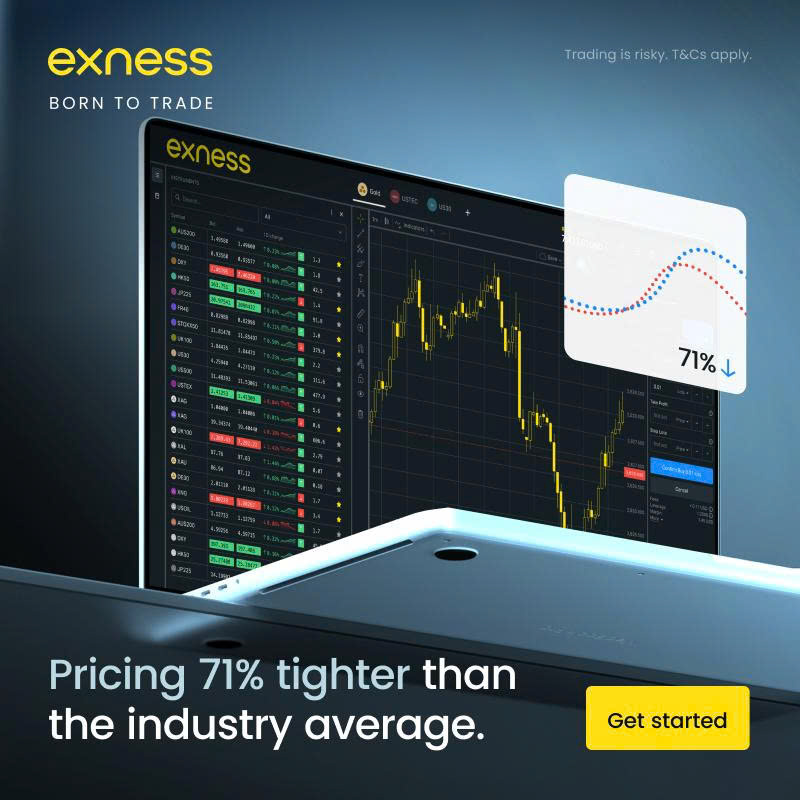
9 minute read
Is Forex Trading Profitable in South Africa? A Comprehensive Guide
from Exness
by Exness Blog
Forex trading has gained immense popularity in South Africa over the past decade, attracting both seasoned investors and newcomers looking to diversify their income streams. With the promise of high returns and the flexibility to trade from anywhere, many South Africans are asking, “Is forex trading profitable in South Africa?” The answer isn’t straightforward—it depends on various factors like knowledge, strategy, discipline, and market conditions. In this article, we’ll explore the profitability of forex trading in South Africa, the opportunities it presents, the risks involved, and practical tips for success.
Top 4 Best Forex Brokers in South Africa
1️⃣ Exness: Open An Account or Visit Brokers 🏆
2️⃣ XM: Open An Account or Visit Brokers 💥
3️⃣ JustMarkets: Open An Account or Visit Brokers ✅
4️⃣ Quotex: Open An Account or Visit Brokers 🌐
What Is Forex Trading?
Forex trading, or foreign exchange trading, involves buying and selling currencies on the global market to profit from fluctuations in exchange rates. It’s the largest financial market in the world, with a daily trading volume exceeding $7 trillion. South Africans are increasingly participating in forex trading due to its accessibility, low entry barriers, and the potential for significant returns.
Unlike traditional investments like stocks or bonds, forex trading operates 24/5, allowing traders to react to global economic events in real-time. For South Africans, this flexibility is particularly appealing, given the country’s unique economic landscape and currency volatility.
Why Is Forex Trading Popular in South Africa?
South Africa’s economic environment makes forex trading an attractive option for many. Here are some reasons why:
· Currency Volatility: The South African Rand (ZAR) is known for its volatility, influenced by global commodity prices, political developments, and economic policies. This volatility creates opportunities for traders to profit from price movements.
· Low Entry Barriers: Forex trading requires minimal initial capital, with some brokers offering accounts starting as low as $10. This makes it accessible to a wide range of South Africans.
· High Unemployment Rates: With unemployment rates hovering around 30%, many South Africans turn to forex trading as a potential source of income or a side hustle.
· Access to Technology: The widespread availability of smartphones and internet access has made it easier for South Africans to trade forex from anywhere.
However, popularity doesn’t guarantee profitability. Let’s dive into whether forex trading can truly be a profitable venture in South Africa.
Can Forex Trading Be Profitable in South Africa?
The profitability of forex trading in South Africa depends on several factors, including knowledge, strategy, risk management, and market conditions. While some traders achieve consistent profits, others face significant losses. Let’s break it down.
The Potential for Profit
Forex trading can be highly profitable for those who approach it with the right mindset and tools. Here’s why:
· High Leverage: Forex brokers often offer leverage, allowing traders to control large positions with a small amount of capital. For example, a 1:100 leverage means a $100 deposit can control a $10,000 trade. This amplifies potential profits (and losses).
· Market Opportunities: The forex market’s volatility provides numerous trading opportunities, especially with ZAR pairs like USD/ZAR or EUR/ZAR, which are heavily traded in South Africa.
· Diverse Strategies: Traders can use various strategies—scalping, day trading, swing trading, or long-term investing—to suit their goals and risk tolerance.
· Global Market Access: South Africans can trade major currency pairs (e.g., EUR/USD, GBP/USD) and exotic pairs involving the ZAR, giving them access to global markets.
Successful South African traders often cite discipline, continuous learning, and risk management as key to their profitability. For example, a trader who consistently earns 5% monthly returns on a $1,000 account could grow their capital significantly over time, assuming they manage risks effectively.
The Risks of Forex Trading
While the potential for profit exists, forex trading is inherently risky. According to industry statistics, approximately 70-80% of retail forex traders lose money. Here are the main risks South Africans face:
· Market Volatility: The same volatility that creates opportunities can lead to substantial losses, especially for inexperienced traders.
· Leverage Risks: High leverage can magnify losses, wiping out accounts if trades go against expectations.
· Lack of Knowledge: Many beginners enter the market without sufficient education, leading to poor decision-making.
· Scams and Unregulated Brokers: South Africa has seen a rise in forex scams, with unregulated brokers targeting inexperienced traders.
· Emotional Trading: Greed, fear, or overconfidence can lead to impulsive decisions, resulting in losses.
To be profitable, South African traders must mitigate these risks through education, strategy, and discipline.

💥 Trade with Exness now: Open An Account or Visit Brokers 🏆
Factors That Influence Forex Trading Profitability in South Africa
Several factors determine whether forex trading will be profitable for you in South Africa. Let’s explore the most critical ones.
1. Education and Training
Knowledge is the foundation of successful forex trading. Without a solid understanding of market dynamics, technical analysis, and fundamental analysis, profitability is unlikely. South Africans have access to numerous educational resources, including:
· Online Courses: Platforms like Udemy, Coursera, and local forex academies offer comprehensive courses on forex trading.
· Demo Accounts: Most brokers provide demo accounts where beginners can practice trading without risking real money.
· Webinars and Communities: South African forex communities, both online and offline, offer valuable insights and mentorship.
Investing time in learning chart patterns, economic indicators, and trading psychology can significantly improve your chances of success.
2. Choosing a Reliable Broker
The choice of broker is critical to profitability. South Africa’s Financial Sector Conduct Authority (FSCA) regulates forex brokers to ensure transparency and protect traders. When selecting a broker, consider:
· Regulation: Ensure the broker is FSCA-regulated or licensed by a reputable international authority (e.g., FCA, ASIC).
· Trading Costs: Look for low spreads and commissions to maximize profits.
· Platform Reliability: Popular platforms like MetaTrader 4 (MT4) or MetaTrader 5 (MT5) are widely used in South Africa for their user-friendly interfaces.
· Customer Support: Choose a broker with responsive support, especially if you’re new to trading.
Examples of FSCA-regulated brokers include Exness, FXTM, and AvaTrade, which are popular among South African traders.
3. Risk Management
Effective risk management is the cornerstone of profitable forex trading. South African traders can protect their capital by:
· Setting Stop-Loss Orders: These automatically close trades at a predetermined loss level, limiting potential damage.
· Using Proper Position Sizing: Never risk more than 1-2% of your account on a single trade.
· Avoiding Overleveraging: While leverage can amplify profits, it can also lead to significant losses if not used cautiously.
For example, a trader with a $1,000 account risking 1% per trade would limit losses to $10 per trade, preserving capital for future opportunities.
4. Trading Strategy
A well-defined trading strategy is essential for consistent profits. Popular strategies among South African traders include:
· Scalping: Making quick, small profits from short-term trades.
· Swing Trading: Holding positions for days or weeks to capture larger price movements.
· Trend Following: Identifying and trading in the direction of market trends.
Testing strategies on a demo account before applying them to a live account is crucial for success.
5. Economic and Political Factors
South Africa’s economy is influenced by global commodity prices (e.g., gold, platinum), interest rate decisions by the South African Reserve Bank (SARB), and political developments. These factors directly impact the ZAR’s value, creating both opportunities and risks for forex traders. Staying informed about local and global economic news can give traders an edge.
How Much Can You Earn from Forex Trading in South Africa?
The amount you can earn from forex trading depends on your capital, strategy, and risk tolerance. Here are a few scenarios:
· Beginner Trader: A beginner with a $100 account and a conservative 2% monthly return could earn $2 per month. While modest, this can grow with compounding and increased capital.
· Intermediate Trader: With a $1,000 account and a 5% monthly return, a trader could earn $50 per month, assuming consistent performance.
· Professional Trader: Experienced traders with larger accounts (e.g., $10,000) and advanced strategies might aim for 10-20% monthly returns, equating to $1,000-$2,000 per month.
However, these figures are not guaranteed. Losses are common, especially for beginners, and profitability requires time, effort, and discipline.
Challenges South African Forex Traders Face
While forex trading offers opportunities, South African traders face unique challenges:
· Currency Conversion Costs: Trading in USD or EUR requires converting ZAR, which incurs fees and affects profitability.
· Internet Reliability: Inconsistent internet access in some areas can disrupt trading activities.
· Tax Implications: Forex profits are subject to income tax in South Africa. Traders must keep accurate records and consult tax professionals.
· Scams and Misinformation: The rise of “get-rich-quick” schemes and fake trading gurus has misled many aspiring traders.
To overcome these challenges, South Africans should prioritize education, choose regulated brokers, and approach trading with realistic expectations.
Tips for Profitable Forex Trading in South Africa
To maximize your chances of success, follow these practical tips:
· Start Small: Begin with a small account and focus on learning rather than chasing quick profits.
· Use a Demo Account: Practice trading strategies risk-free before investing real money.
· Develop a Trading Plan: Outline your goals, risk tolerance, and strategy to stay disciplined.
· Stay Informed: Follow economic news and events that impact the ZAR and global currencies.
· Avoid Emotional Trading: Stick to your plan and avoid impulsive decisions based on fear or greed.
· Join a Community: Engage with South African forex trading communities on platforms like X or local forums for support and insights.
Is Forex Trading Worth It in South Africa?
Forex trading can be profitable in South Africa, but it’s not a get-rich-quick scheme. Success requires education, discipline, and effective risk management. While the potential for high returns exists, so do significant risks, especially for inexperienced traders. By choosing a regulated broker, developing a solid strategy, and staying committed to learning, South Africans can increase their chances of profitability.
Final Thoughts
Forex trading offers South Africans an opportunity to participate in the global financial markets and potentially generate significant income. However, it’s not a guaranteed path to wealth. The key to profitability lies in understanding the market, managing risks, and approaching trading as a long-term endeavor. If you’re considering forex trading, start with a demo account, invest in education, and choose a reputable broker. With the right approach, forex trading can be a rewarding venture in South Africa.
💥 Note: To enjoy the benefits of the partner code, such as trading fee rebates, you need to register with Exness through this link: Open An Account or Visit Brokers 🏆
Read more:

